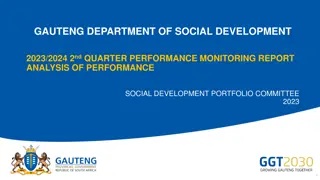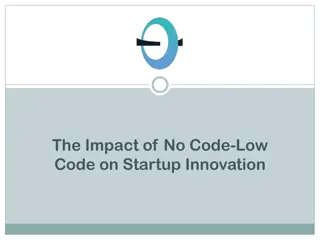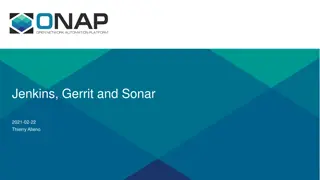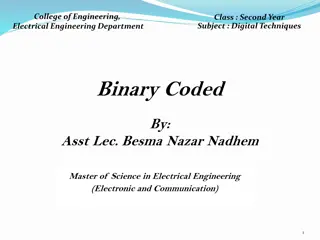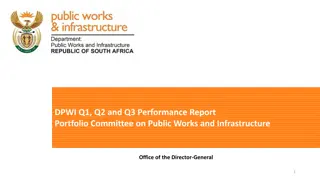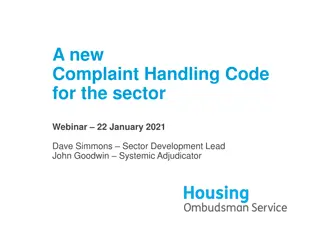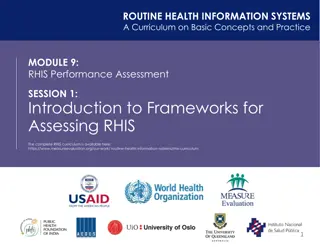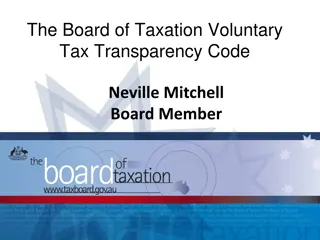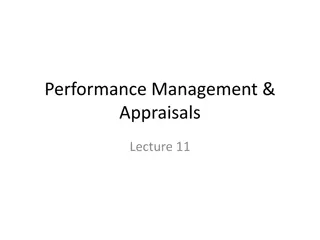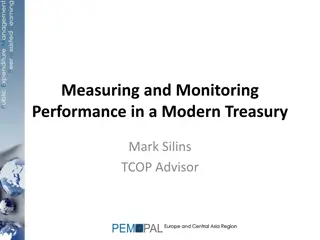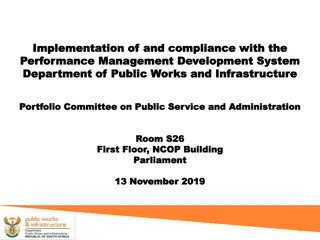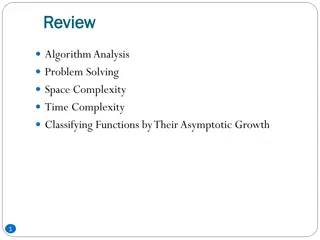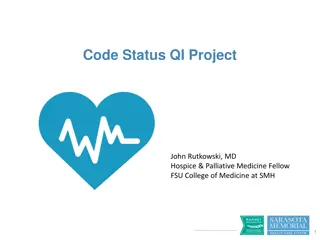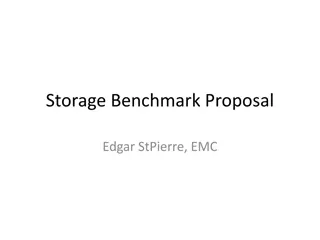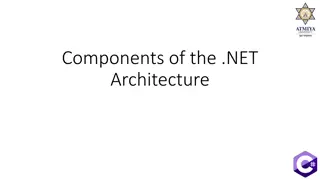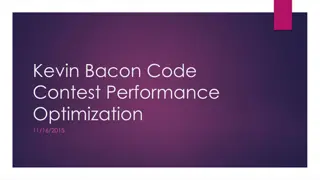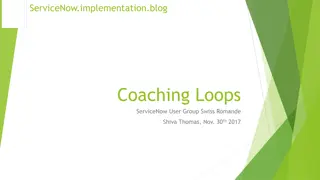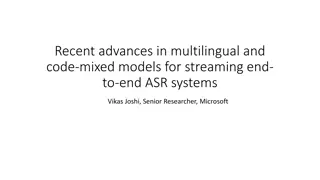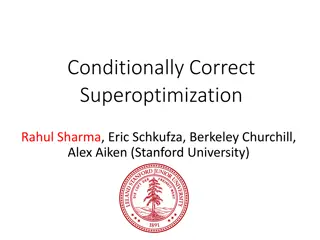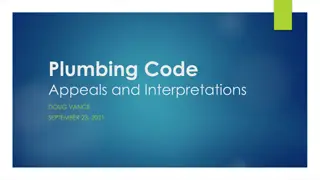Conducting Performance Appraisals Training
Importance of performance appraisals, the company's philosophy and policy, the appraisal process, and how it impacts employee pay. It emphasizes ongoing performance management, goal setting, feedback, and support for employees to achieve exceptional performance. The training includes discussions on
1 views • 23 slides
sefa's Q1 Performance Report FY 2023/24 Presentation
sefa's Q1 performance report for the financial year 2023/24 highlights challenges such as economic constraints and internal operational issues affecting loan book performance. Despite these challenges, sefa has made efforts to drive performance and support SMEs. The report covers areas like organisa
1 views • 25 slides
Gauteng Department of Social Development 2nd Quarter Performance Analysis 2023/2024
Analyzing the 2nd quarter performance monitoring report of the Gauteng Department of Social Development for 2023/2024 reveals insights into program performance, governance, financial status, and rating categories. The report delves into departmental overview, non-financial performance, and areas of
0 views • 70 slides
The Impact of No Code-Low Code on Startup Innovation
In the vibrant world of startups, innovation is the cornerstone of success. As these businesses aim to carve out their niches, they often face a common hurdle: the extensive resources required for traditional software development. However, the emergence of low code no code (LCNC) platforms is revolu
2 views • 12 slides
Improving Code Analysis Workflow with Jenkins, Sonar, and Gerrit
Enhance code analysis processes by analyzing source code before merging, enabling analysis in branches, and triggering Jenkins jobs. Sonar.cloud provides options to analyze branches using Maven build, while the proposal suggests using Jenkins plugin for code review. Addressing challenges with Gerrit
1 views • 12 slides
Overview of Performance Management Systems and Competency Mapping
Performance Management Systems (PMS) play a crucial role in ensuring organizational objectives are met through individual contributions. This entails continuous improvement at all levels - individual, team, and organizational. Managing performance is vital for survival and growth in a competitive en
3 views • 45 slides
Work Planning and Performance Evaluations - An Overview
This introduction covers the importance of work planning and performance evaluations in achieving organizational goals. It outlines the stages of the evaluation process, including work planning, work progress review, formal performance evaluation, and performance evaluation interview. Guidance on us
2 views • 35 slides
Understanding Performance-Based Acquisition and its Benefits
Performance-Based Acquisition (PBA) focuses on achieving results rather than the process. It involves Performance Work Statements (PWS), which describe desired outcomes clearly. This approach enables measuring performance against standards and encourages innovation and cost-effective methods. By emp
0 views • 28 slides
Understanding Binary Coded Decimal (BCD) and Excess-3 Code
Binary Coded Decimal (BCD) is a binary code used to represent decimal numbers, with the popular 8421 BCD code and its conversion process explained. Additionally, Excess-3 Code, another BCD code, is detailed with an example of finding its code for a given decimal number. Different BCD codes like 4221
0 views • 11 slides
Quarterly Performance Report Presentation to Portfolio Committee
This report presents the performance of the Department for the 1st, 2nd, and 3rd quarters to the Portfolio Committee on Public Works and Infrastructure. It includes non-financial and financial performance details, color coding guide, target achievements, performance averages, management performance
0 views • 43 slides
A New Complaint Handling Code for the Sector - Webinar Highlights
This webinar discusses the introduction of a new Complaint Handling Code for the sector, aiming to address issues in social housing complaint processes. It covers key points, the background leading to the code's development, the Ombudsman's experience, and the code's aims and framework towards high-
0 views • 14 slides
Understanding RHIS Performance Assessment Frameworks
Explore the concepts and practices related to Routine Health Information Systems (RHIS) performance assessment through this curriculum. Learn about RHIS standards, performance factors, and frameworks for assessing performance. Engage in group exercises to identify underlying problems and causes in R
7 views • 16 slides
Understanding Business Performance Measurement (BPM) and Essential Elements
Business Performance Measurement (BPM) refers to the processes used by organizations to assess their performance and achieve set goals. It involves employing tools, techniques, methodologies, and metrics to monitor and manage business performance. Performance measures help evaluate progress, goal ac
4 views • 57 slides
The Board of Taxation Voluntary Tax Transparency Code Overview
The Board of Taxation developed a voluntary Tax Transparency Code to address community concerns and promote greater tax transparency among large businesses. The Code outlines recommended disclosures for both large and medium businesses, encouraging adoption of higher disclosure standards. Internatio
0 views • 20 slides
Simplifying AI Development with Low-Code and No-Code Platforms
Explore the world of low-code and no-code AI development platforms, empowering experts to create applications with ease. Learn about the benefits, tools, and components of these innovative platforms, and discover popular AI tools for no-code development. Accelerate your digital transformation journe
0 views • 11 slides
Understanding Performance Management and Appraisals in the Workplace
Performance management and appraisals are crucial processes for evaluating employees' performance, setting work standards, providing feedback, and facilitating career planning. This involves assessing employees' performance relative to set standards, identifying training needs, and aligning individu
8 views • 23 slides
Modern Treasury Performance Management Framework
Explore the key elements of measuring and monitoring performance in a modern treasury, highlighting the importance of strategic planning, risk assessment, performance frameworks, and client orientation. Learn about performance evaluation, key performance indicators, and the integration of budget and
4 views • 17 slides
Implementation of Performance Management Development System at Department of Public Works and Infrastructure
Briefing the Portfolio Committee on Public Service and Administration on the implementation and compliance with the Performance Management Development System (PMDS) within the Department of Public Works and Infrastructure. The content covers aspects such as signing of performance agreements, PMDS pl
1 views • 20 slides
Understanding Pseudo Code and Flow Charts for Algorithm Analysis
Explore the concepts of pseudo code and flow charts for analyzing algorithms, problem-solving, and understanding space and time complexity. Learn about basic elements of pseudo code, assigning operations, and writing effective pseudo code statements in a clear and structured manner. Discover the imp
0 views • 26 slides
Enhancing Code Status Discussions in End-of-Life Care: A Quality Improvement Project
This project led by Dr. John Rutkowski aims to reduce inappropriate interventions for patients with DNR or Modified Code Status by implementing an improved code status documentation system. Data analysis reveals a need for better documentation practices, and survey responses highlight various challe
0 views • 18 slides
Storage Benchmark Proposal for NFVI Performance Measurement
Proposal for the "STORPERF" project led by Edgar St. Pierre from EMC aims to provide tools to measure block and object storage performance in an NFVI environment. The project includes defining test cases, metrics, and test processes, as well as identifying open-source tools and integration points. I
0 views • 12 slides
Overview of 2009 IECC Energy Code in West Virginia
West Virginia updated its residential building energy code to follow the 2009 IECC, with a partnership forming to facilitate adoption. The state's climate zone requirements, notable building envelope regulations, and energy efficiency improvements post-2013 are highlighted. Stakeholders, including b
0 views • 18 slides
Understanding the .NET Architecture Components
The .NET architecture comprises various key components such as the Common Language Specification, Code Manager, Managed Code, Unmanaged Code, and Native Code. These components play crucial roles in the development and execution of applications within the .NET framework. Managed code is executed by t
0 views • 21 slides
Challenges in Code Search: Understanding, Matching, and Retrieval
Programming can be challenging due to the lack of experience and unfamiliar libraries. Code search engines struggle with representing complex tasks, while information retrieval techniques aim to bridge the gap between source code and natural language queries. The mismatch between high-level intent a
0 views • 21 slides
Software Quality and Source Code Management Best Practices
Effective source code management is crucial for software quality assurance. This involves locking down code, baselining milestones, managing code variants, and ensuring traceability. Software Configuration Management (SCM) is key, encompassing configuration items and core concepts like creating base
0 views • 34 slides
Institutionalizing Performance Budgeting: Key Institutions and Actors
This presentation by Teresa Curristine from the IMF in Colombia discusses essential building blocks for Performance Informed Budgeting (PIB), designing PIB systems, incentivizing performance improvement, engaging political leadership, and dispelling myths regarding performance budgeting. It emphasiz
0 views • 26 slides
Enhancing Wind Turbine Performance Through PCWG Activities
The PCWG (Performance Characterization Working Group) aims to improve real-world wind turbine performance prediction beyond the simple Power=P(v) equation. By introducing concepts like Inner-Outer Range Decomposition and Average-Specific Decomposition, the group addresses factors such as environment
0 views • 13 slides
Kevin Bacon Code Contest Performance Optimization Techniques
Explore strategies for improving performance in the Kevin Bacon Code Contest of 11/16/2015 by delving into the app's functionality, addressing issues with single-threaded HTTP processes, and optimizing performance through Visual Studio profiling tools. Discover insights on selecting the right collec
0 views • 15 slides
Understanding Coaching Loops for Improved Performance
Coaching loops are a method of enhancing performance by providing iterative feedback to guide individuals towards high performance. Unlike traditional feedback methods, coaching loops allow for real-time influence on the process outcome, improving overall effectiveness. By implementing the Kepner-Tr
0 views • 24 slides
Challenges and Advances in Multilingual and Code-Mixed ASR Systems
Recent advances in multilingual and code-mixed models for streaming end-to-end ASR systems present challenges including low resource Indic language data, multiple dialects, code-mixing, and noisy environments. These challenges impact ASR modeling by causing convergence issues, higher Word Error Rate
0 views • 34 slides
Multi-Label Code Smell Detection with Hybrid Model based on Deep Learning
Code smells indicate code quality problems and the need for refactoring. This paper introduces a hybrid model for multi-label code smell detection using deep learning, achieving better results on Java projects from Github. The model extracts multi-level code representation and applies deep learning
0 views • 10 slides
NSH_SFC 17.01 Performance Report Summary
The NSH_SFC 17.01 Performance Report focuses on measuring and analyzing the performance of various elements such as Service Function Forwarder, NSH Proxy, NSH Classifier, and more in the context of VPP 17.01 for different SFC ingredients. Baseline performance is established using IXIA-based PacketGe
0 views • 7 slides
Overview of CAIN Particle Tracking Code for High-Energy Colliders
CAIN is a particle tracking code used for high-energy collider simulations since 1984. Initially named ABEL, it evolved to include beam-laser interactions for gamma-gamma colliders. The code, written in FORTRAN 90, handles beam-beam and external fields, with a structure where all particles are store
0 views • 17 slides
Lazy Code Motion and Partial Redundancy Elimination in Optimizing Compiler
Lazy code motion, partial redundancy elimination, common subexpression elimination, and loop invariant code motion are optimization techniques used in compilers to improve code efficiency by eliminating redundant computations and moving code blocks to optimize performance. These techniques aim to de
0 views • 35 slides
Loop Invariant Code Motion in Frequent Paths for Optimization
Loop Invariant Code Motion (LICM) is a key optimization technique that identifies and moves code operations whose operands remain constant within a loop to improve performance. The process involves careful consideration of memory operations and operations not executed every iteration. The assignment
0 views • 20 slides
Understanding Job Performance and its Determinants
Job performance encompasses what employees do and the results they achieve, often influenced by factors beyond their control. Productivity, evaluative nature, and multidimensional aspects characterize performance evaluation. Performance is determined by declarative knowledge, procedural knowledge, a
0 views • 14 slides
Superoptimization: Accelerating Code Performance through Conditional Correctness
Explore the concept of superoptimization, a technique to generate optimal code implementations for performance-critical systems. The process involves enumerating all possible programs, transforming them with loops, and proving equivalence with the original code. While optimizations are formally veri
0 views • 22 slides
Unleash the Power of JavaScript Slot Machine Code for Your Online Casino (1)
Learn how to create captivating online slot machines with JavaScript Slot Machine Code, Casino game code, Casino game HTML code, HTML5 casino games source code, Slot machine JavaScript for your platform.\n\nKnow more>>\/\/ \/javascript-slot-machine-c
0 views • 4 slides
Hardware Performance Monitoring with Kernel Modules
This document explores the use of hardware performance counters and cycle counting on x86 and ARM architectures for monitoring and analyzing system performance. It covers topics such as the utilization of hardware counters, cycle counting on x86 processors, and the ARM Performance Monitor Unit (PMU)
0 views • 12 slides
Plumbing Code Appeals and Interpretations Overview
This document provides information on the agenda, upcoming professional development events, Building Code Appeal Board, Appeal Board decisions, Code Interpretation Committee, code interpretations, and final thoughts related to plumbing code appeals and interpretations. It covers the appeal process,
0 views • 8 slides


